
August 2021 to June 2024
Background
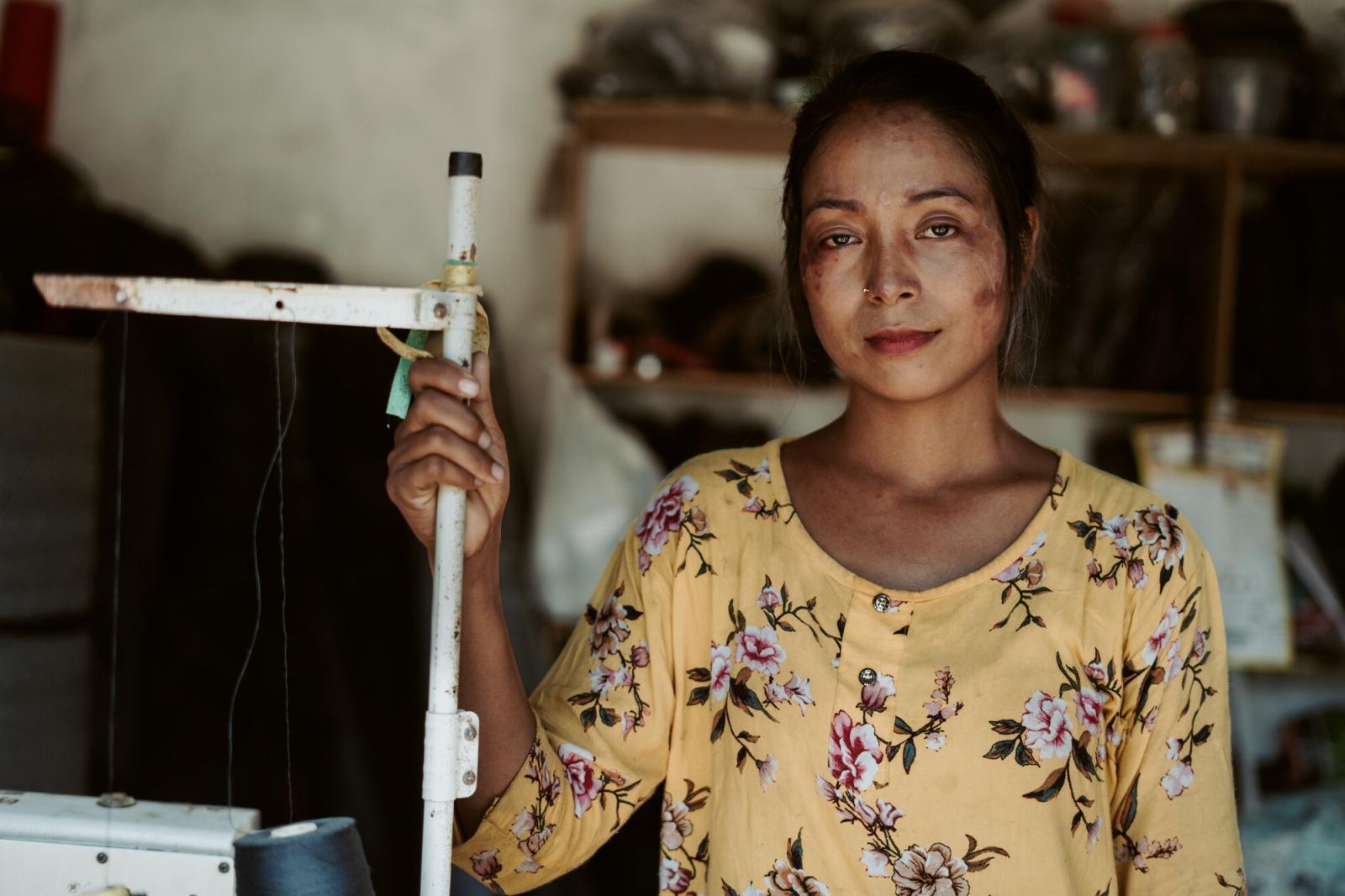
In 2016, the United Nations Population Fund (UNFPA), in collaboration with the Government of Nepal and supported by the Norwegian Embassy and the Swiss Agency for Development and Cooperation, launched a groundbreaking initiative to combat gender-based violence across Nepal.
The first phase of the Gender-Based Violence Prevention (GBVPR) project targeted Koshi, Bagmati, and Sudurpashchim Provinces, aiming to empower women and girls while strengthening response services.
Building on this foundation, the second phase commenced on August 5, 2020, and concluded in June 2024. Led by VSO, the project has made significant strides in reaching around 90,000 individuals across 19 municipalities in Koshi and Sudurpashchim Provinces. This phase has not only sustained but expanded the comprehensive model of gender-based violence prevention and response developed during the first phase.
Throughout its duration, the project engaged with a diverse range of stakeholders including couples, families, adolescents, schoolteachers, community-based organisation members, as well as opinion and religious leaders.
The prevention component of the project has been pivotal in achieving the project's primary outcome: enabling women, men, girls, and boys to increasingly prevent, report, and address gender-based violence. By transforming harmful norms and breaking the culture of silence surrounding gender-based violence, the project has empowered communities to raise their voices and seek appropriate services.
Moreover, the project has built the capacity of community volunteers, peer facilitators, and gender-based violence champions, and has worked closely with local governments to ensure effective project implementation. This collaborative approach has not only heightened awareness, but has also fostered a more proactive and supportive environment for addressing gender-based violence in the targeted municipalities.
Gender-based violence prevention

VSO played a pivotal role in the project on the prevention component by developing comprehensive training manuals, guidelines, and conducting 'Training of Trainers' sessions for community volunteers on VSO's Gender Transformative Approach.
These efforts enabled community volunteers to organise couple sessions in 83 wards across 19 municipalities, hold discussions with community-based organisation members, and conduct follow-up sessions with couples and intergenerational dialogues. The gender transformative approach was a key strategy in the prevention component, designed to impart knowledge and skills that promote reflection and change gender-discriminatory attitudes.
Additionally, VSO conducted training sessions for peer facilitators to run school programs (Rupantaran sessions) in 83 schools and provided capacity building for gender-based violence champions to lead family sessions and follow-up meetings with program participants.
In collaboration with UNFPA's capacity-building partner, Prevention Collaborative, VSO enhanced the skills of prevention component implementing partners in 2023, focusing on the gender transformative approach , reflective facilitation skills, and referral services for gender-based violence survivors.
In 2024, VSO extended the gender transformative approach training to relevant government and non-government stakeholders in all working municipalities.
This training aimed to deepen participants' understanding of gender-based violence prevention and ensure the continued application of the gender transformative approach in their efforts to prevent and respond to gender-based violence.
What we achieved in numbers
We met or surpassed all our targets reaching:
6,981 couples
12,474 family members of couples
40,000 people indirectly through wider events
Additionally we also reached 6,730 adolescent boys and girls, 20,491 community-based organisation members and 494 influential opinion leaders.
The project also built the capacity of 71 volunteers and staffs (38 community volunteers, 19 gender-based violence champions, eight field supervisors, six field mobilisers), 166 teachers, 313 peer facilitators and additional 201 local government and other stakeholders on gender-based violence prevention and the gender-transformative approach, ensuring the longevity of the project impact, even after the project phase out.
Project outcomes
Couple discussions
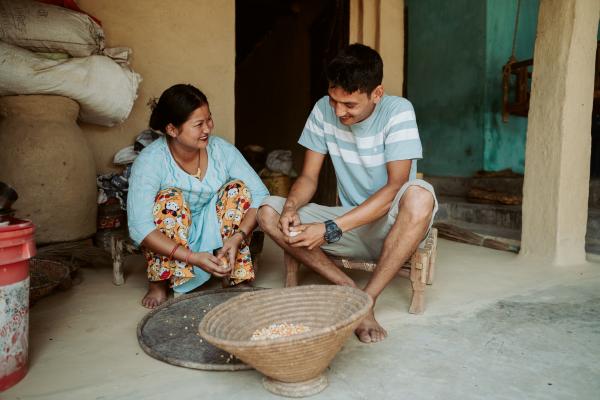
Couples from the target areas have been part of sessions on assertive communication between the couples and family members, reproductive health, family planning, gender-based violence, referral mechanisms, harmful social norms, and the need for supporting each other for a dignified life.
In the post test, 90% of men and women of program participants shared that they have improved their understanding of social norms, gender equality, gender-based violence and referral mechanisms. After the session, they shared the positive shifts in their attitudes, beliefs, and behaviours around gender norms, roles, and violence.
Women shared that their husband is now engaged in household chores thus their workload has been reduced. They have more time for them for self care and economic empowerment and report building stronger relationships with their partner.
Another positive result is that many have now obtained their marriage registration and citizenship certificates. Women feel empowered to openly share their views with their partners and families, helping in breaking the culture of silence in gender-based violence
After the couple session, the project engaged the families of couples through family dialogues, which aimed to improve the understanding of family members on gender equality, positive masculinity, social and gender norms, gender-based violence and its consequences and how to access support services. This encouraged them to promote gender equitable environment in their family and support to speak and report against gender-based violence.
The session was reflective and participatory where family members openly shared their opinion towards gender and social norms, violence, and its consequences. Through these sessions, family members were aware of the issues of harmful social norms, gender-based violence and consequences of violence. In addition, family members showed their commitment to build gender equitable environment to prevent gender-based violence.
Achievements:
- Gained knowledge on various topics including effective communication, sexual and reproductive health, harmful social norms and practices.
- Changed in attitudes and beliefs around gender norms, roles, and violence.
- Increased engagement of men (husbands) in household chores and prioritizing quality family time much more than they did before.
- Obtained marriage registration, citizenship certificate.
- Women’s representation and decision making has increased not only in the family but in the community as they have taken up leadership roles.
- Built stronger relationships to openly share their views that helped in breaking the culture of silence in gender-based violence.
- Local level stakeholders recognised the importance and effectiveness of couple sessions in reducing intimate partner violence and gender-based violence.
Working with adolescents (Rupantaran)

Rupantaran means transformation in the Nepali language. The project used the Rupantaran training package, developed in collaboration with the Department of Women and Children, and technical support by UNICEF and UNFPA.
It is a complete adolescents’ empowerment package provides the adolescent girls with practical skills and knowledge on gender equality and human rights (including child marriage related information), reproductive health, gender-based violence, communication, decision making and negotiation skills etc.
The project uses seven manuals out of 15 manuals and adapted other curriculum from VSO Sammanit Jeevan and teens manual as per project objectives.
89% of adolescents shared that they have enhanced knowledge, life skills and attitudes to make informed decisions about marriage, education and sexual and reproductive health and found changes in themselves and their beliefs/ behaviour.
After attending the sessions, adolescents started reflecting and sharing learning with peers, parents and communities thereby boosting their confidence, they have improved relationships with their teachers and parents due to enhanced communication skills. Focal teachers also validated that students are more engaging that helped to improve their learning outcomes.
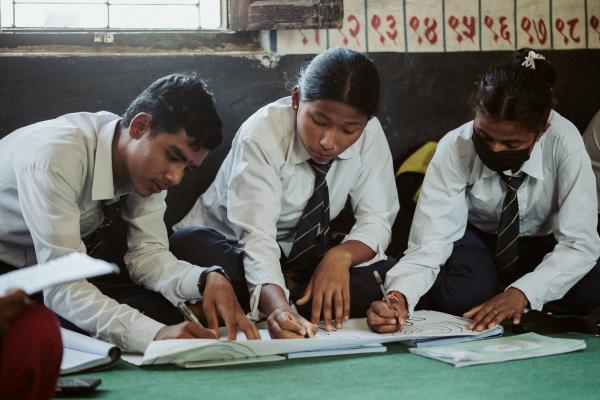
The project supported to reform or form the child clubs in all working school to spread Rupantaran session's learning among child club's members and diffuse the key messages of the project and relevant information to wider community.
Regular child club meetings were helpful in disseminating key messages (on social norms transformation and gender-based violence prevention), sharing key learning among peers, and most importantly seeking support from school management and teachers in facilitating diffusion process.
Achievements
- Increased understanding and oppose child marriage and gender-based violence, confidently persuading others.
- Increased confidence openly speaking at school and improved facilitation skills, prioritise needs, and maintain realistic expectations.
- Recognised harmful practices like child marriage and sexual harassment, understanding concepts such as good touch, bad touch, and safe places. They challenged some restrictive practices, including those related to menstruation.
- Confidently discuss sexual and reproductive health with family members and friends, a topic they were previously hesitant about.
- Exhibit behavioural changes, reducing drug use and promoting awareness among peers. They embrace positive health attitudes, with boys actively participating in gender equality at home.
Intergenerational dialogues
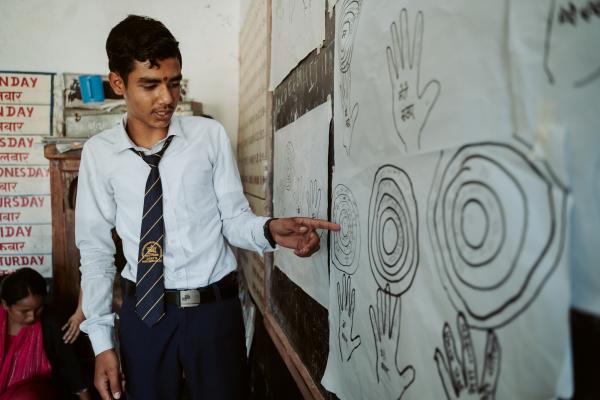
Reflective intergenerational dialogue sessions with separate groups of men attended couple session and boys from Rupantaran session and similarly women and girls have been continued in all program area. The programme aimed at promoting common understanding of gender-based violence, social norms, harmful social norms among women and girls and men and boys of all age groups, to encourage them to work in collaboration to prevent violence.
Through these dialogue sessions, couples and adolescents had the opportunity to share their learning and experiences of participating in the couple session and Rupantaran session, respectively. These dialogues created a space for adolescents and men and women groups to have open discussion and exchange learning and experience. This was also helpful to raise a collective voice against harmful social norms and practices.
Achievements
- Intergenerational dialogues facilitated open discussions between adolescents and adults, fostering exchange of learning and experiences, and promoting collective action against harmful social norms and practices.
- Participants expressed commitment to raising their voices against gender-based violence, harmful social norms and practices.
- The program created valuable learning opportunities for individuals of all genders, including boys, girls, men, and women.
- Capacity development (Community volunteers and Peer facilitators)
- 38 community volunteers received training on the gender transformative approach, reflective practices and critical reflection.
- 313 peer facilitators received trainer training on Rupantaran. Local government offices have already engaged them in the gender-based violence prevention program and peer facilitators have been engaged to use their skill in other school to run Rupantaran programs conducted under local government allocated budget.
Group discussions with community based organisations:
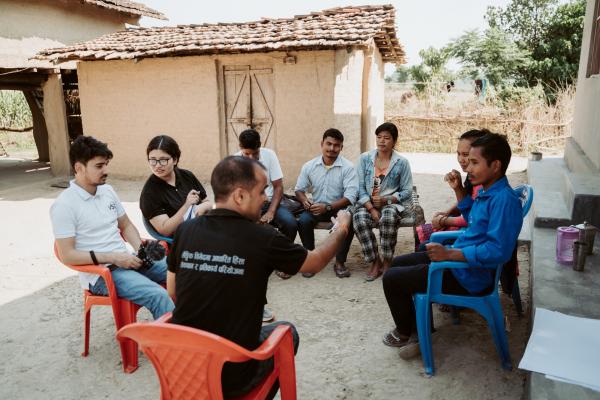
Community-based organisation members from local women’ group, water users’ group, forest users’ group, tole development committee, cooperative group and agricultural group participated in the discussion program. They enhanced knowledge on the issues related with gender-based violence, harmful social norms, and practices and about referral mechanism.
Their roles and responsibilities on gender-based prevention and supporting survivors of violence were at the centre of the discussion of the program.
From the discussion and post evaluation with community-based organisation members, we found that large number of community-based organisations aware of issues of social norms, gender-based violence , available services and referral mechanism. They have increased commitment to transformation of harmful social norms, supporting survivors of violence and gender-based violence prevention.
Community-based organisation members organised interaction and awareness programs on gender-based violence prevention, end child marriage, harmful social norms, and practices.
Achievements:
- High number of community-based organisation members participated in training and were informed about social and gender norms, harmful practices, gender-based violence elimination funds, and referral mechanisms.
- Showed commitment to support survivors of violence and developed plans to discuss GBV issues during their regular meetings. They were also made aware of their roles and responsibilities in preventing gender-based violence and supporting survivors.
Gender-transformative dialogues with opinion leaders
The program also engaged elected, religious, traditional, and other influential community leaders and conducted dialogue with them and aimed at orienting leaders on harmful social norms and practices present that underpin gender-based violence. Furthermore, discussion was held on prevention strategies to reduce violence through their working modality.
Achievements
- Knowledge gained on harmful social norms, violence types, and consequences, referral mechanisms, services, and legal provisions related to gender-based violence fostering a commitment to speak up against violence.
- Local government initiated and proposed to conduct religious/opinion leader dialogue.
Local government commitments
There are regular coordination meetings with local government officials, During the meetings, program teams discuss on gender-based violence and advocacy for budget allocation in activities that contribute to gender equality and gender-based violence prevention. A few local governments, with support from the project team, have taken up the running of couple sessions and Rupantaran sessions by themselves.
Since the project began, utilization of the allocated gender-based violence elimination fund has also increased and now local governments are supporting survivors of gender-based violence and providing medical, legal, shelter and livelihood support.

Stories and case studies
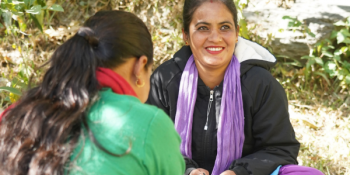
Stories of empowerment: three Nepali women reclaiming their space
In Nepal, more than one in four women experience gender-based violence. To mark International Women's Day, we’re sharing the stories of three women from a VSO project in Nepal, who are helping to end violence against women and girls.
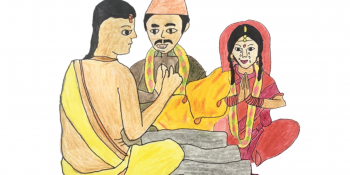
Voices for Justice: three changemakers stand up against gender-based violence
Three stories of people confronting gender-based violence in Nepal. With illustration by eight-year-old artist and photographer Vidheha Ranjan from Kathmandu, Nepal.
